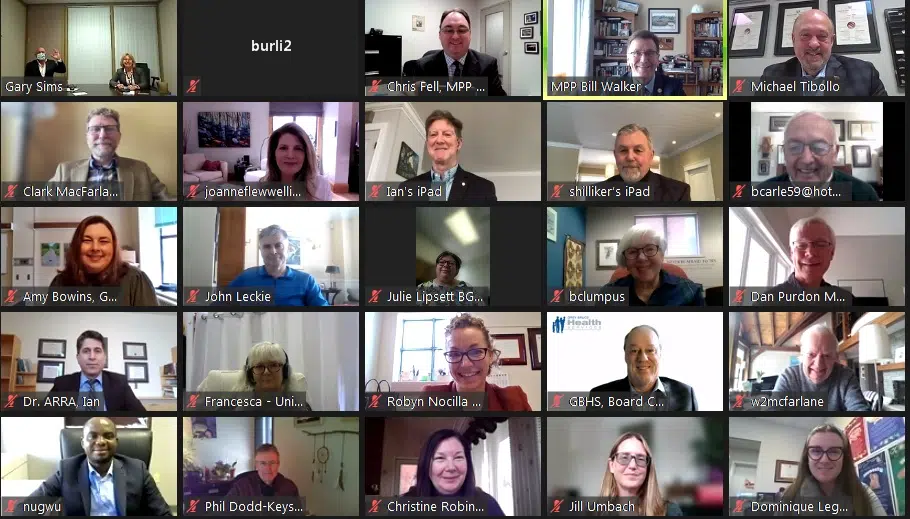Dozens of new addiction treatment beds are coming to Owen Sound as part of a new model of treatment.
Ontario Associate Minister of Mental Health and Addictions Michael Tibollo says he hopes it will become a model for the rest of the province. “I’m looking forward to analyzing the numbers of the people that are going to be helped with this centre and then using this as a model for other parts of the province.”
Roughly $6 million dollars for the initiative was announced today in a virtual meeting hosted by Bruce-Grey-Owen Sound MPP Bill Walker featuring Tibollo and attended by area mayors, community organizations, and local health services.
The money is coming through the provincial government’s new Addiction Recovery Fund. Tibollo says today’s announcement is part of $90 million in funding over three years to support almost 400 addiction beds across Ontario. He says that translates into between 7,000 and 7,500 new treatment spots in Ontario.
A release from MPP Bill Walker’s office says, “Studies have shown that opioid-related deaths surged by 79 per cent during the first two waves of the pandemic, with rates being three times higher in Northern Ontario.”
This will bring 36 new local treatment beds for specialized addictions treatment to Owen Sound. That will break down into 14 addictions treatment beds, 12 withdrawal management beds and ten supportive treatment beds. On top of nine existing beds, that makes 45.
To start, 12 new beds will go into the existing Grey Bruce Health Services (GBHS) treatment centre on 9th Ave in Owen Sound. GBHS says it will integrate the rest of the beds into other local hospitals and finally, put them into one facility in a year.
It’s not clear if the former Bayview School will be the eventual building, as had originally been conceptualized. Grey Bruce Health Services President and CEO Gary Sims says they’re looking at a number of locations and will know more in the next few months.
Grey Bruce Health Services Director of Mental Health and Addiction Services Naomi Vodden has been working on this model and advocating for it the past few years. She says, “This facility will provide detox services with medication management, stabilization following evidence-based best practice and long-term treatment. We will enable clients to stay onsite up to six months with a wraparound approach, including case management.”
In an emotional response to the announcement, Vodden who with her colleagues has designed and advocated for this treatment centre added, “This is our dream, my whole team’s dream.”
She says, “We’ll have case management, counselling, psychiatry, addiction medicine, specialized trauma and floor care, recreational, vocational and educational support. These services will be provided with close relationships to our community partners.”
Vodden continues, “The centre will provide recovery and healing spaces that utilize trauma informed care and recovery principles. This space will include indigenous art and sacred spaces and we will work with our community to ensure access to elders. Social workers, addiction and mental health counsellors, nurses, recreational and vocational staff, physicians and nurse practitioners will all be involved in providing care.”
“Peer support workers will work with clients and families and be an integral part of the care team,” says Vodden.
She adds, “We will also have designated indigenous and transgender beds to ensure equity in our services.”
Meanwhile, Tibollo, who has spent ten years volunteering at a bed-based treatment facility in York Region, says, “I saw many people as a result of bed-based treatment recover and regain success in terms of the direction that they took their lives. That’s something that I am very much interested in, in ensuring that everyone has that opportunity. We know that those opportunities are best achieved when individuals get the supports and the help they need as close to home as possible.”
Tibollo says, “We know that there’s been a need for creating and growing high-quality and culturally sensitive addictions care and services across the province. That includes the rural, the northern and the Indigenous communities”
Chair of the Grey County Mental Health and Addictions Task Force Chair and Owen Sound Deputy Mayor Brian O’Leary says, “Mental health and addictions have deep reaching effects on the community. through the services we deliver at the County, we have seen an increased need for more supports and a treatment facility in this area.”
The virtual announcement drew significant attendance, Including GBHS, Canadian Mental Health Association Grey Bruce, Keystone Child and Youth Family Services, Bruce Grey Child and Family Services, Owen Sound Police, the United Way of Bruce Grey, Public Health, the mayors of Owen Sound, Meaford and West Grey, among other local representatives and community organizations.




